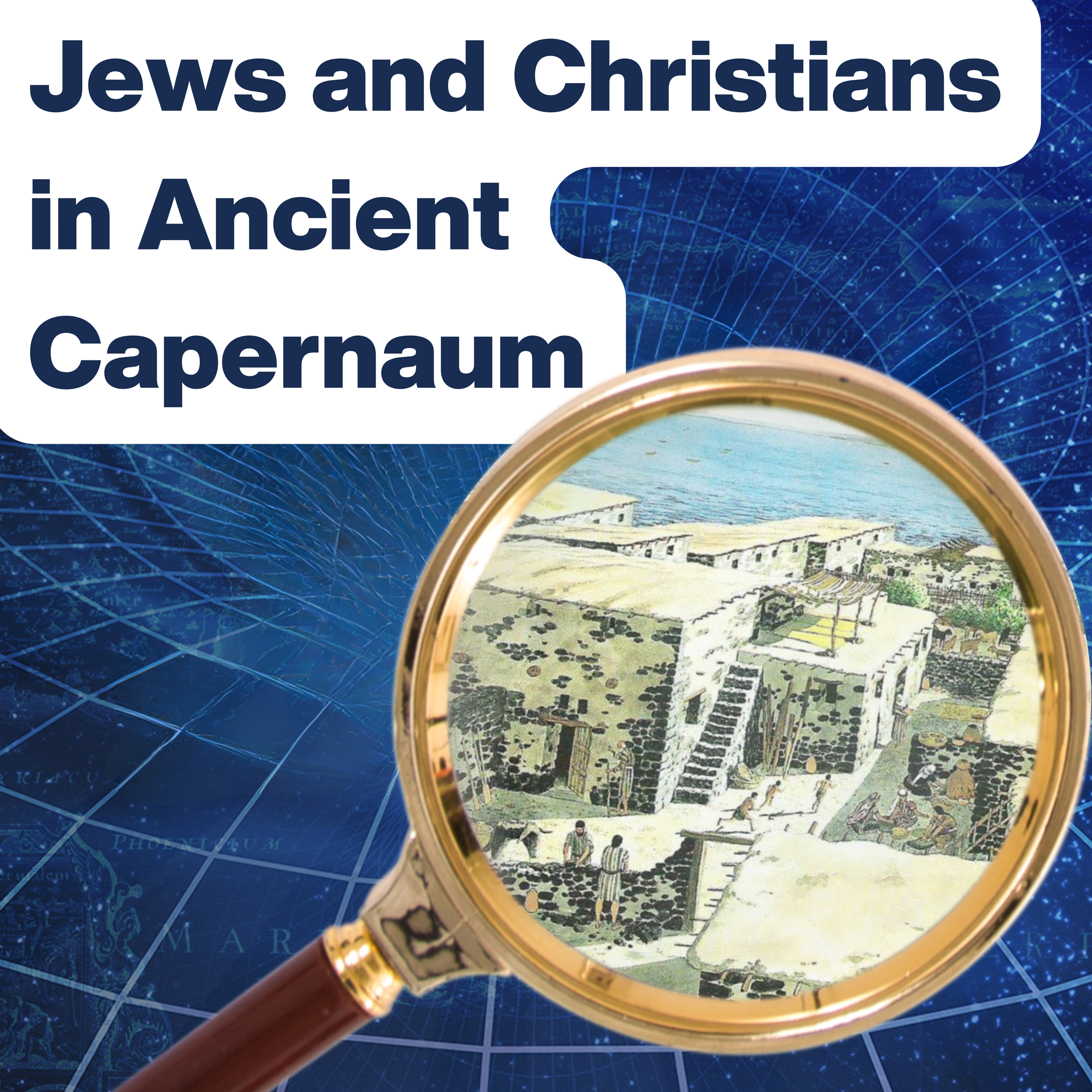
Ep. 57 Capernaum: the Archeology of a Jewish and Christian Village
Capernaum is known as "the Town of Jesus," since so many of Jesus's miracles and preaching happened in this small town on the Sea of Galilee. In the centuries after Jesus's death, Capernaum transformed from a Jewish fishing village into a Christian holy site. Thanks to archeology, we can learn more about Jewish-Christian relations in Capernaum during this much-debated period in the history of the Holy Land.

Ep. 56 Leprosy in the Bible — What Was It?
The history doctor is in! Helen and Dave welcome Dr. Ricky Shinall — an MD with a PhD in biblical studies — to help us diagnose leprosy in the ancient world. Did biblical leprosy have anything to do with modern Hansen's disease? Were lepers considered "untouchable" pariahs? And what does all of this have to do with ritual impurity?

Ep. 55 The Ancient Jews (and Temple) of Elephantine Island
In the 6th Century BCE, on a tiny island in the Nile River, once stood a Temple to Yahweh. Far from Jerusalem, the ancient Jews of Egypt's Elephantine Island worshipped a mighty god they called "Yaho" in one of the first diaspora Jewish communities outside of Palestine. How they got there and who they became is a fascinating and little-known story.

Ep. 54 Who Wrote the King James Bible?
"Thou shalt not" miss this episode about the King James Bible, the most-read literary work in the English language! But who was King James? Why did he order a new English translation of the Bible (there were plenty out there already)? And who were the translators tasked with this monumental project (hint: not Shakespeare)?

Ep. 53 Did Jesus Bless a Same-Sex Relationship?
The New Testament story known as the "Healing of the Centurion's Slave" has been the subject of some intriguing scholarship in recent years. In the Greco-Roman world, the Greek word translated as "slave" or "servant" in the Bible also meant the younger partner in a same-sex male relationship. So the question is: by healing the Centurion's partner, did Jesus effectively bless a same-sex relationship?

Ep. 52 David & Goliath Like You’ve Never Read It Before
Heroic stories like David and Goliath were told for centuries before they were written down. But the creative storytelling process didn't end there. Written texts were "performed" and improvised upon, creating new variations that made it into later texts. The Bible that we have today was the product of ongoing "conversations" between oral and written traditions.

Ep. 51 Parables: Jesus’s Shocking Short Stories
In the New Testament, Jesus often teaches through parables — short stories rich in symbolism and ethical dilemmas. "The Good Samaritan." "The Prodigal Son." We've heard these stories so many times it's easy to overlook how challenging and even shocking they would have sounded to 1st-century ears.

Ep. 50 Pseudepigraphy: Forgery or Fan Fiction?
Ancient authors had no problem writing texts in other people's names, and that includes plenty of biblical writers. If Paul only wrote 7 of the 13 Pauline epistles, for example, who wrote the other 6, and why did they stamp Paul's name on them?

Ep. 49 Why the Bible Was Written
The Hebrew Bible wasn’t created by one of the mighty empires of the Ancient world — Egypt, Assyria, Babylon — but written in the rubble of a small, conquered kingdom. So how has this “epic monument to defeat” not only survived for 2,600 years, but spawned three world religions and influenced countless lives? Because the authors of the Hebrew Bible invented something completely new. They created a “people.”

Ep. 48 What Would Jesus Wear?
There's so much we get wrong about clothing and dress in the 1st Century. Did Jewish people dress differently than gentiles? No. Did most men have long hair and beards? No. Did Jesus and the disciples rock sandals with socks? Yes!

Ep. 47 Animals in the Ancient World
The Bible is literally crawling with animals — from the crafty serpent of Genesis to Jesus's parable of the lost sheep. That's because animals (both wild and domesticated) were an integral part of life in the ancient world.

Ep. 46 A Cultural History of Christmas
Try as you might, you won't find Santa Claus in the Bible. Or Christmas trees, or camel-riding Magi, or even December 25th! In the first centuries of Christianity, Christmas wasn't really a "thing." The birth of Jesus was far less important than his death and resurrection. So how did Christmas evolve from an afterthought into the biggest holiday on the planet?

Ep. 45 A Second Look at Mary, Mother of Jesus
In the first of two Christmas episodes, Helen and Dave take another look at arguably the "best-known and least-known" woman in history: Mary, the mother of Jesus. Our guest, the fantastic James Tabor, collects the few breadcrumbs of information about Mary in the New Testament and weaves together a compelling narrative about a Jewish matriarch at the center of the Jesus movement.

Ep. 44 Hanukkah History: The Maccabean Revolt
The Jewish festival of Hanukkah is based on real historical events — the Maccabean Revolt of 167-160 BCE. In today's episode, Helen and Dave travel back to a time when Judaea was ruled by the Hellenized (Greek) Seleucid Empire. When a Jewish priest named Mattathias refused to make a sacrifice to the pagan gods, it sparked a violent revolution led by Judah "The Hammer" Maccabee.

Ep. 43 Biblical Blackness: Cush, the "Curse of Ham" and the Queen of Sheba
The Bible is largely silent about race. People are identified by their lands of origin and beliefs, not their skin color. Yet centuries of biblical interpreters have read race into the Bible, for good and for ill.

Ep. 42 Who Chose the Books of the New Testament?
Starting in the 1st century CE, there was an explosion of Christian literature — dozens of gospels, letters, apocalypses and more — but only a fraction of those texts made it into the New Testament canon. Who decided which books were in and which books were out?

Ep. 41 What Ancient Coins Can Teach Us About the Bible
When we recognize the Bible as a product of the ancient world, we can look for subtle ways that biblical authors incorporated elements of everyday life — including coins! We spoke with historian Michael Theophilos about everything we can learn from ancient coins (politics, economics, visual culture, propaganda), and then we found some fascinating examples of how language and symbols from coins made their way into the Bible.

Ep. 40 Everything We Get Wrong About Jesus and Jewish Impurity Laws
It’s easy to read the New Testament and come away with the idea that Jesus was in opposition to the Jewish ritual impurity laws. In fact, most Christian theologians taught that for the past 2,000 years. Is it possible that we’ve (gasp!) been misreading the Bible this whole time? Our guest Matt Thiessen says, “Yep.”

Ep. 39 Halloween Special: God’s Monsters
There aren’t any werewolves or vampires in the Bible, but God deploys his own terrifying army of monsters. Have you heard of cherubs? Not what you think! Even angels have some less-than-angelic duties. It turns out that the shepherds abiding in the field had good reason to be “sore afraid.”

Ep. 38 Did the Author of John Know the Other Gospels?
At first reading, the Gospel of John feels a world apart from the other gospels. The language is different, there are new stories (see our episode on "the woman taken in adultery") and Jesus speaks about himself in bolder terms ("I am the resurrection and the life." "I am the light of the world.") That has led some scholars to argue that the author of John didn't know the synoptic gospels and was instead working from other sources, probably oral traditions about Jesus circulating in the 1st century CE.